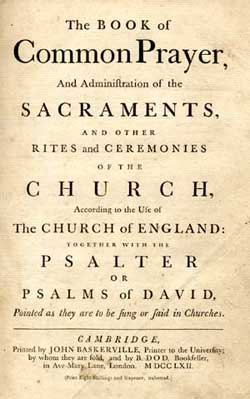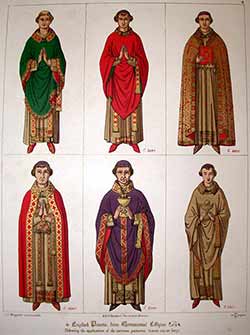 “THE Morning and Evening Prayer shall be used in the accustomed Place of the Church, Chapel, or Chancel; except it shall be otherwise determined by the Ordinary of the Place.” (BCP 1662 The Order for Morning and Evening Prayer).
“THE Morning and Evening Prayer shall be used in the accustomed Place of the Church, Chapel, or Chancel; except it shall be otherwise determined by the Ordinary of the Place.” (BCP 1662 The Order for Morning and Evening Prayer).
“All Priests and Deacons are to say daily the Morning and Evening Prayer either privately or openly, not being let by sickness, or some other urgent cause.” (BCP 1662 Concerning the Service of the Church).
This regulation, which continued until the late 20th century to be binding on the Anglican Church in New Zealand, may have been, in some/many places, more honor’d in the breach than the observance.
The response to this neglect by some, was that our church met at General Synod and passed a bill to remove the requirement. That was then sent to all dioceses, who met at diocesan synods and passed their agreement to this being removed. The bill returned to General Synod and was passed there again, and then it was left a year for anyone to make a protestation.
After this, priests and deacons could legally stop praying morning and evening prayer.
Some continue to maintain this discipline of prayer. Some bishops are trying to get their clergy back into praying at least morning prayer.
This story never ceases to astonish me: rather than understanding that sometimes it will not be possible for people and clergy to pray the daily office, and seeing the “rule” as an ideal, this church removed the norm of a daily praying clergy! The Reformation brought the daily office out of the monasteries and presbyteries, and made it an ideal for the whole church, clergy and lay – an ideal of common prayer, a daily discipline of all in God’s presence, all immersed in the biblical worldview. That ideal appears lost.
We are celebrating 350 years of the Book of Common Prayer 1662. Many of its principles and rationales are deeply sound. There is much we can learn from it, embodying its principles into our different time and context. The whole church (clergy and lay) celebrating daily prayer appears to me to be one of those principles which, in this anniversary year, is appropriately renewed. Where was the motion at General Synod Te Hinota Whanui to reinstate and renew a praying church?!

The Ornaments Rubric
As well as this section of the BCP1662 leading to the above reflection, at this point we also find what is termed the “Ornaments Rubric”:
“The Chancels shalt remain as they have done in times past.
And here is to be noted, that such Ornaments of the Church, and of the Ministers thereof, at all Times of their Ministration, shall be retained, and be in use, as were in this Church of England, by the Authority of Parliament, in the Second Year of the Reign of King Edward the Sixth.” (BCP 1662 The Order for Morning and Evening Prayer).
You don’t have to be a genius to realise that in the Second Year of the Reign of King Edward the Sixth the Prayer Book was that of 1549 (The First Prayer Book of Edward VI) which prescribed:
Upon the date and at the tyme appoincted for the ministracion of the holy Communion, the Priest that shal execute the holy ministery, shall put upon hym the vesture appoincted for that ministracion, that is to saye: a white Albe plain, with a vestement or Cope. And where there be many Priestes, or Decons, there so many shalbe ready to helpe the Priest, in the ministracion, as shalbee requisite: And shall have upon them lykewise the vestures appointed for their ministery, that is to saye, Albes with tunacles.
image source
1888 Chromolithograph Costume Vestment Ceremonial Medieval Bishop Robes Deacon – Original Chromolithograph



Startling, isn’t it. As a spiritual director I continually meet clergy who have no structured prayer life, and for whom the idea of using the Daily Office as a way of praying is considered ‘infantile’ or ‘old hat’. So very sad, and one of the first things I generally work with them to change.
In fact, I now know more lay people who pray the Daily Office in some form (I tend to favour Daily Prayer from Common Worship) than clergy.
It’s interesting to note in this regard that in many new experiments in Christian living – especially those loosely labelled “New Monasticism” – a recurring theme is the discovery of rhythms of liturgical prayer
What year did General Synod pass the legislation to cease the practice of daily offices?
1987, Raymond. Blessings.
Gobsmacked
What on earth were we thinking????
If it hadn’t been 6 in the evening when I read this I would have choked on my breakfast cereal, Bosco.
Words fail me
Astonishment is I guess one response to it. I found myself to say the least deeply disturbed
Sorry I have nothing more constructive to add
Lord have mercy on us all
Eric, my reaction is (obviously!) much like yours.
What on earth were we thinking? Here’s some options:
* it is not good for Kiwis to “feel guilty”
* if some/many are breaking a rule – change the rule
* common prayer is not important
* prayer is not important
* the Bible is not a matrix for prayer
* tradition is bad
* the daily office is “too catholic”
add more…
Blessings
HI Bosco – apologies for answering a tweet via this thread – haven’t really got my head round the mechanics of conversing via twitter
(If you can point me to a suitable SHORT tutorial I’ll gladly do my best!)
As to my thinking saying the Office should be a requirement, I think that your point above about Rule makes this well. That the Rule is an Ideal, AND that ideals are Necessary. After all, why do we rehearse the Great commandment every Sunday???
5 minutes truthful inspection of our hearts tell us we would rather do Anything that pray. The Requirement Places us where we need to be but oft would rather not be.
Michael Ramsey I think made a comment in ‘Christian Priest Today’ about needing to get halfway through the office before he began to pray. I suggest ever so gently that he knew far more about prayer than the combined knowledge in this area of many today.
Put bluntly, those of us in orders are called to pray for those entrusted to our cure. The Office is the Means by which we cannot avoid that which our own waywardness would gladly avoid.
Next we’ll be saying ‘no need to partake of the Eucharist’ on a regularly basis . . . etc etc
Also, re some of your explanations, the Office drags us out of the mire of our own subjectivity, in which much of our prayer is more than happily immersed, be it happy or mournful
Just a couple of thoughts
Of course that anyone should submit to anyone for any reason whatsoever is a tad passe 🙂
Blessings on your ministry
Eric
PS Apologies for my use of capitals – all for EmPhasis 🙂
PPS time for Vespers 😉
Yes, Eric, to all that; including I too have recently prayed Vespers, and will in a bit pray Compline. And yes, there will be clergy in NZ who understand Eucharistic regularity to mean monthly (or quarterly!) Some will not even have Eucharist as the main service Easter Day! Blessings.
…
of course, ’twas always thus’, as any person even vaguely educated in the history of the church will readily attest. There was no ‘Golden age’ either of the church, or re: this thread, the clergy. Clergy down through the ages were and remain often desultory in prayers, and I cannot exclude myself – But there always was the Rule, the Ideal. It is the removal of such things that I find deeply troubling.
It is Very interesting, indeed Hopeful to note however, whilst ‘established’ churches seem to be abandoning such things, their is gathering interest amongst some emerging churches for such deep practices as ordering of common life.
We may not yet see MacIntyre’s ‘St. Benedict’ but his spirit is alive it seems
Grace and Peace to you, Bosco, and thank you for alerting me to this. As an ‘offcummdun’, as we said where I grew up, a little cultural orientation never goes amiss!!
I only discovered from this blog that in NZ we are not required to say the Office, and am still reeling from the shock. I’d like to add a couple of things:
(1) The Office connects us with our tradition, and identifies us with the communion of Saints in which we profess Sunday by Sunday to believe;
(2) It is a basic way of redirecting our prayer – prayer is not about us, it is about God, and without a Rule embodied in the regular saying or singing of the Office, our egos – not to mention the Enemy – have plenty of room to play;
(3) It is a question of catholicity, something else in which we profess, Sunday by Sunday (or day by day, if we say the Apostles’ Creed at Morning Prayer), to believe – our prayer is linked with the prayer of the whole Church. How many of our passing difficulties in the Church would look different if we recognised that we are to pay unceasingly, together, before the Throne of Grace?
(4) It is a question of how our minds are to be formed into the mind of Christ – how better than by a rhythmic pattern of praise, Scripture, and intercession?
In Christ, James
That should, of course, have been “pray” unceasingly – Freudian slip 🙂
‘How many of our passing difficulties in the Church would look different if we recognised that we are to pay unceasingly, together, before the Throne of Grace?’
Great point James – To Pray is to Believe, to Believe is to Pray
After many years as an atheist I returned to the church – I chose the Anglican Church – bought books on the 39’Articles of Religion ( griffith thomas and bricknell) bought a copy of the 1662 – liturgy of the hours – catholic- Anglican Breviary – and prayed with the One Holy Catholic Church – morning and evening 1662 and at other times. I could not imagineba clergy where this would not occur until I disvovered that it is no longer a pre-equisite? I remember way back in 1966 going to the anglican church for evening prayers – just me and the priest – him shouting out the page numbers etc for me! How the mighty have fallen!
Thanks, Ed. It would be of interest (at least to me) to know what percentage of NZ Anglican clergy still pray the Daily Office. Blessings.